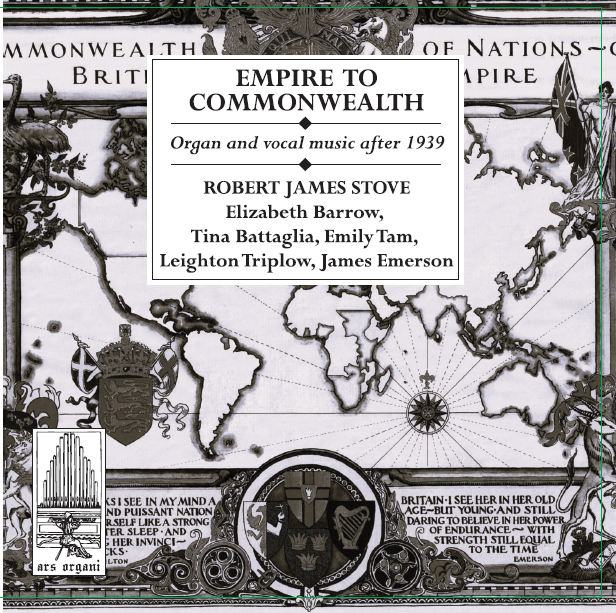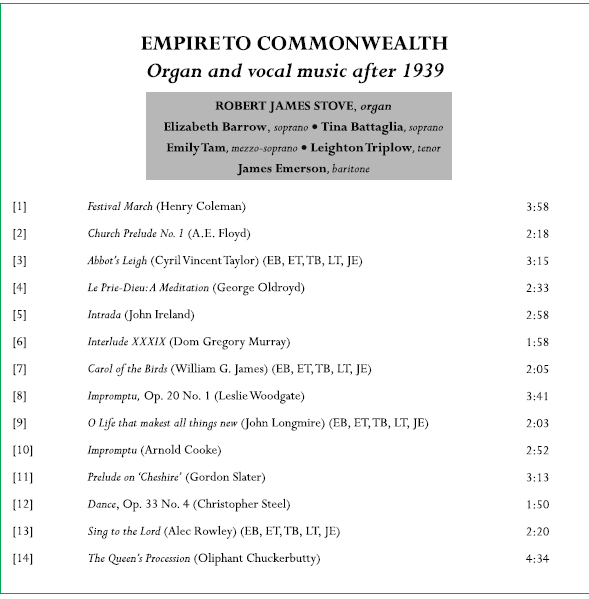Empire to Commonwealth
‘I have seen much to hate here, much to forgive,
But in a world where England is finished and dead, I do not wish to live.’
– ‘The White Cliffs,’ by Alice Duer Miller (1874–1942)
Tracklist
Released in the aftermath of Charles III’s coronation, and intended as a sequel to Undertones of War (2022), Empire to Commonwealth (Ars Organi AOR005) asks the question: how did the end of Britain’s imperial ambitions affect the world of music? The answers are often surprising.
Whereas Undertones of War consisted exclusively of pieces from Britain itself, Empire to Commonwealth lives up to its title by including pieces from Australia and New Zealand as well as the United Kingdom. The Australian-resident A.E. Floyd, the Australian-born William G. James, and the New Zealand-resident John Longmire are all represented in the new collection.
In accordance with the tradition established by earlier Ars Organi anthologies, Empire to Commonwealth includes numerous compositions never previously recorded. Once again, the chosen venue – its warm yet clear acoustic splendidly captured by producer Thomas Grubb – is Melbourne’s Camberwell Basilica, with its wonderful late-Romantic organ. And once again, solo organ works alternate with vocal works, the latter including performances from outstanding young Australian singers.
Creations by Oliphant Chuckerbutty, Henry Coleman, Arnold Cooke, John Ireland, Dom Gregory Murray, George Oldroyd, Alec Rowley, Gordon Slater, Christopher Steel, Cyril Vincent Taylor, and Leslie Woodgate are all to be heard on Empire to Commonwealth. The result will give listeners new insights into unduly overlooked repertoire.
Undertones of War
Undertones of War, released in June 2022, is the fourth CD from Ars Organi. It consists of British compositions from after the Great War.
Some of the composers represented on this CD (Sir Charles Villiers Stanford, Sir Walter Galpin Alcock, Sir Richard Runciman Terry, Vaughan Williams, Basil Harwood) had grown up in the high unclouded summer of Victorian confidence and peace. Others (John Ireland, Peter Warlock, Geoffrey Turton Shaw) were coeval with those ‘Tommies’ who fought and died in appalling numbers on the Western Front. Still others (Elizabeth Poston, Norman Fulton) were still of school age on Armistice Day. Not a single British composer could altogether escape the emotional and social impacts of the conflagration itself.
Each work on Undertones of War has about it something not only distinctive in national terms, but reflective of its particular creator’s temperament. Certain pieces included – notably Ireland’s The Holy Boy and Warlock’s Adam lay ybounden – have become tolerably well known. But of the seventeen compositions included on the CD, no fewer than eight are here given their first-ever recordings.
On each track, as per Ars Organi’s earlier releases, organist Robert James Stove is heard. With several tracks he is joined by some of Melbourne’s finest young singers: Elizabeth Barrow, Brigette De Poi, Emily Tam, Leighton Triplow, and James Emerson.
Once again, Thomas Grubb’s superb engineering skill has captured the results in a vivid and lively acoustic where, nevertheless, every detail can be detected. Thanks to these factors, Undertones of War will shed new light on an oft-neglected area of twentieth-century music.
Undertones of War Critics’ Praise
‘Dr Stove is evidently in his element, which is not surprising as his doctoral thesis was on Stanford’s organ output. His playing is always precise and his registrations are well chosen. Furthermore, his choice of organ at Our Lady of Victories, Camberwell, Victoria, blessed with a good acoustic, is ideal. The singers work well as soloists and as a group.’
— Pastór de Lasala, Sydney Organ Journal
‘Throughout, organist Stove meets the demands of the music with naturalness and conviction, never drawing excessive attention to himself. … The young Australian singers who join Stove on various of the tracks have compact, healthy voices; I must particularly mention the near-angelic Elizabeth Barrow, whom I hope to hear in other repertory soon.’
— Ralph P. Locke, The Arts Fuse [Boston]
French Romantic Church Music
When Scott Fitzgerald wrote ‘France has the only two things towards which we drift as we grow older – intelligence and manners,’ he was not, it is safe to say, thinking mainly about French music. Yet he should have done so, because France’s music is one of its outstanding national treasures.
You could be forgiven for supposing that by now, nearly all French music was a known quantity. But you would be wrong. For proof, here is Ars Organi’s latest CD, devoted to sacred compositions from France’s belle époque: the late nineteenth and early twentieth centuries.
Even most French musicians are unfamiliar with the output of Alexandre Guilmant (1837–1911), who ranked among the leading organists of his
time, and who was also a thoroughly skilled composer for his instrument. Numerous works in this collection, whether by Guilmant himself or
by the other French musicians to whom he was closest, have never been
previously recorded.
Some of the composers represented here are famous: César Franck, Camille Saint-Saëns, Charles-Marie Widor. Others belong these days in the ranks of the half-remembered: Marcel Dupré, Vincent d’Indy, Louis Vierne. Still others are more or less totally forgotten: Cyprien Boyer and Louis-Lazare Perruchot, anyone?
French Romantic Church Music includes vocal as well as solo organ pieces. These are sung by five of Melbourne’s finest young singers, whose panache and tonal clarity add to the charm of this production.
Once again, as with earlier Ars Organi CDs, engineer Thomas Grubb has captured a church acoustic – this time Camberwell Basilica in suburban Melbourne – with awesome fidelity and attention to detail. Banish post-lockdown miseries with French Romantic Church Music, the ideal introduction to an often overlooked adornment of French cultural life.
PAX BRITANNICA
So you think you know what British music sounds like?
Think again …
Following on from Ars Organi’s first CD, issued in 2018 (The Gates of Vienna: Baroque Organ Music from the Habsburg Empire, AOR001) comes another recording. But this one, available since 1 August 2019, is devoted to a very different kind of organ music.
Once again, the performer is Robert James Stove. (He’s heard here on the organ of Melbourne University’s Anglican residential chapel.) Yet whereas The Gates of Vienna surveyed Continental works from the 17th and 18th centuries, Pax Britannica surveys – as the title suggests – British works. From, moreover, the apogee of the ‘empire on which the sun never set’, during the late 19th and early 20th centuries.
On this CD, such eminent composers as Sir Edward Elgar, Sir Hubert Parry, Sir Charles Villiers Stanford, and Dame Ethel Smyth are all represented. So are various thoroughly obscure figures who prove to be a well worth revival.
How many compositions by William Wolstenholme, William Thomas Best, Alfred Rawlings, or Henry Alexander John Campbell, have you encountered to date? Well, these and many other talented musicians from Victoria’s and Edward VII’s reigns have been included. Almost a third of the material on this disc has never been recorded before.
The brilliant production work of Mano Musica’s Thomas Grubb has, once again, ensured admirably vivid engineering in which each nuance of tone from ‘the King of Instruments’ is captured with remarkable realism, from the gentlest whisper to the most assertive climax. Every lover of organ music should own Pax Britannica.
Pax Britannica Critics’ Praise
‘Pax Britannica will make a valuable addition to the collections of pipe organ devotees.’
— Christopher J. Luke,
New Zealand Organ News [Auckland]
'This very well-produced disc is deserving of a place in any self-respecting collection.’
— Robert Matthew-Walker, The Organ [London]
‘Robert James Stove’s judicious playing … An intriguing collection.’
— Michael Quinn,
Choir & Organ [Salisbury, Wiltshire]
‘Performed on the impressive Kenneth Jones organ in the chapel of Trinity College, the Anglican residential college of the University of Melbourne, this disc presents no fewer than eight world premieres. Stove says he is out to “win more enthusiasts for a repertoire too commonly neglected,” and he has certainly given it his best shot.’
— Colin Clarke,
Fanfare [Tenafly, New Jersey]
'The works are described in extensive (and very welcome) programme notes, written by the performer, who plays on the Kenneth Jones organ at Trinity College Chapel, very well recorded indeed by Thomas Grubb in a fine acoustic ... It is very pleasing that such neglected repertoire is explored here and Robert Stove has served the task eloquently.'
— John Maidment, Organ Historical Trust of Australia News [Melbourne]
THE GATES OF VIENNA
Before the British Empire, there was the
Habsburg Empire…
Ars Organi's first CD (AOR001), issued in July 2018, was The Gates of Vienna: Baroque Organ Music from the Habsburg Empire. Performed by Robert James Stove on the splendid organ of St Patrick’s Catholic Church in the Melbourne suburb of Mentone, this recording includes works by Johann Jakob Froberger, Georg Muffat, Gérard Scronx, Jan Zach, and other composers of the seventeenth and eighteenth centuries.
The disc's title refers to the 1683 Siege of Vienna, where combined Austrian and Polish forces routed the invading Ottoman army. This victory is also commemorated by the engraving on the CD’s cover.
Some of the works in this collection have not only never been released on CD before, they have never been recorded at all. The Gates of Vienna is captured in admirably vivid sound that conveys the opulence, powerful bass notes and piercing reeds of ‘the King of Instruments’. It serves as a fascinating guide to one of the richest and most enjoyable periods of music history.
Click here to view the recording’s Melbourne launch (July 2018).
The Gates of Vienna Critics’ Praise
‘Every selection is rendered stylishly and with panache, and the entire proceedings are well recorded. The booklet provides well-written notes by Stove, specifications for the organ, and a brief artist bio. … This is Stove’s debut recording, and also the first release by the brand-new Ars Organi label; on the basis of what is offered here, both deserve a warm welcome and hearty recommendation.’
— James A. Altena,
Fanfare [Tenafly, New Jersey]
‘[In] the works of Georg Muffat, Johann Kaspar Kerll, Johann Jakob Froberger, Lambert Chaumont, Jan Zach and others there is a “substantial variety of mood and approach.” As there is in Stove’s thoughtful, supple and imaginative playing on the 1862 two-manual organ of St Patrick’s, Mentone.’
— William Yeoman,
Limelight [Sydney]
‘Stove wisely varies his program so as to highlight the range of the organ and avoid boring the listener … He is clearly a master of the instrument. If the daring listener were to wish to venture into solo organ music for the first time, I would recommend R.J. Stove’s The Gates of Vienna as an ideal starting point.’
— Stephen M. Klugewicz,
Modern Age [Wilmington, Delaware]
‘The instrument has a convincing range of voices, and the edge and attack are splendid throughout.’
— Brian Hick,
The Organ [London]






